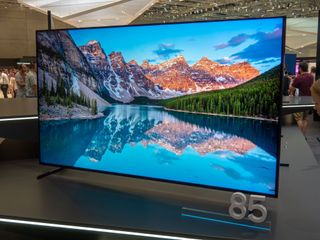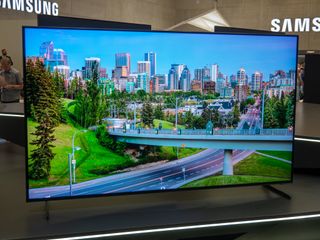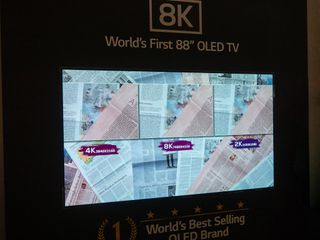Price isn't the only reason you don't need an 8K TV right this second
(But that doesn't mean these new TVs aren't ridiculously awesome.)

If there's one thing we learned from the IFA conference in Berlin, it's this — 4K televisions aren't the pinnacle of living room display tech. It's not that we didn't know this already — 8K resolutions haven't exactly been secret. (And, again, it's just math.)
But 8K sets have moved from the labs to the consumer space, with two of the predictable players rolling out their first models. LG got out of the gate first , with an unnamed 8K model. Samsung followed a day later with even more details — most notably that you'll actually be able to buy an 8K TV in October.
That doesn't mean you have to junk your old 4K TV, though. Or even your 1080p TV. Nope, these things are as much about the companies that are producing them as they are the consumers who will have to figure out just how the hell they'll get them into their homes.
Or, put it another way: You don't have to run out and buy an 8K TV the moment it's released.
Price very much is an object
The price of TVs — and that includes the price of 4K TVs — continues to fall. You can get a decent 4K set at a decent size for well under $1,000 these days.
The first 8K TVs will cost far more than $1,000. Quadruple that, actually, and you'll probably be in the ballpark. That'll vary somewhat depending on model, of course — Samsung's Q900R will come in sizes of 65, 72, 82 and 85 inches. But you get the idea.
Unless you just have to have the latest and greatest because it is both the latest and the greatest and you don't mind shelling out just to be able to say you've got the latest and greatest, your current 4K TV probably is just fine, especially for everyday use. And it should be for quite some time.
Get the What to Watch Newsletter
The latest updates, reviews and unmissable series to watch and more!
Price will come down, of course, just like it has for 4K televisions. But we're a few years away from that happening.

Source content is still important
Then there's the whole "8K" thing in the first place. We're talking about resolution, of course — the number o individual pixels that make up the display of the television. More pixels is almost always better — you get better colors and finer details and the whole thing has the potential to be that much better.
A 4K television has a resolution of 3840 x 2160 — more than 8 million total pixels, or roughly four times more pixels than a 1080 TV (which sports a resolution of 1920 x 1080). An 8K TV ramps things up even further to 7680 x 4320, for a ridiculous total of some 33 million pixels.
But potential to be better is the operative word here. Because the display is just one part of the equation. Without good source material, the best hardware in the world is wasted. It's like when you see old video — say, from 2002 — on a new display and it looks all pixellated and blurry.
That doesn't mean everything will be bad, though. These 8K TVs will "upscale" everything. (And they've all got fancy new AI processors to do it.) If you're using 4K source material — particularly from something like a Blu-ray Disc, it should look great on an 8K screen. But good 4K content — particularly when you're streaming video — is still far more rare than we'd like. And upscaling only goes so far before it falls down. So will you really get as much out of an 8K TV as you might from an 4K TV? Not really.
At least, not yet.

16K ZOMGLED is on the way! (Not yet, but probably, eventually.)
It seems like it was only yesterday that we were extolling the virtues of 1080p video — never mind the newer 4K resolution. And that's because it pretty much was only yesterday. And depending on the application, a 1080p TV might be just fine. I'm not going to spend the extra money for a 4K TV on my back porch, for example. Or maybe not for a spare bedroom, either.
On the other hand, 4K has very quickly become the standard. It'll take a few years, but it most certainly will be overtaken by 8K displays, just as 4K has overtaken 1080p. And one day something will overtake 8K.
But we've got a long ways to go, still. The source content just isn't there. And our ISPs remain unfriendly to the sort of data consumption that even 4K resolutions require.
It's fair to complain that companies are trying to get us excited about this new 8K technology before we've even fully bought in to 4K technology. Because they are — that's their job. And it's fair to say that OLED (and Samsung's QLED) technologies are awesome, but still not in the budget for most folks.
And something newer and better is always coming.
